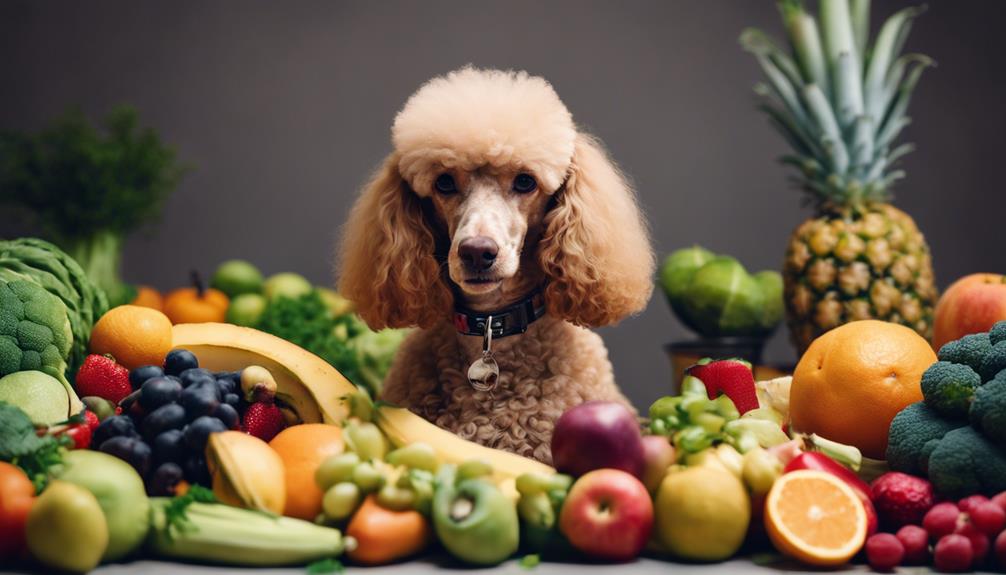Did you know that Poodles are prone to certain health issues that can be managed through proper nutrition? Ensuring your Poodle's diet is well-balanced is crucial for their overall well-being. From the right proteins to essential fats and carbohydrates, each component plays a significant role in your furry friend's health. But what exactly does a balanced diet for a Poodle entail? Let's explore the key essentials that will keep your Poodle happy and healthy.
Key Takeaways
- Poodles require high-quality proteins, essential fats, digestible carbs, and vital vitamins/minerals for optimal health.
- Real meat sources like chicken, beef, or fish are crucial for muscle maintenance and overall well-being.
- Balanced Omega-3 and Omega-6 fats support coat health, joint function, and cognitive well-being.
- Carbohydrates from sources like sweet potatoes, brown rice, and oats provide essential energy for daily activities.
Nutritional Needs of Poodles
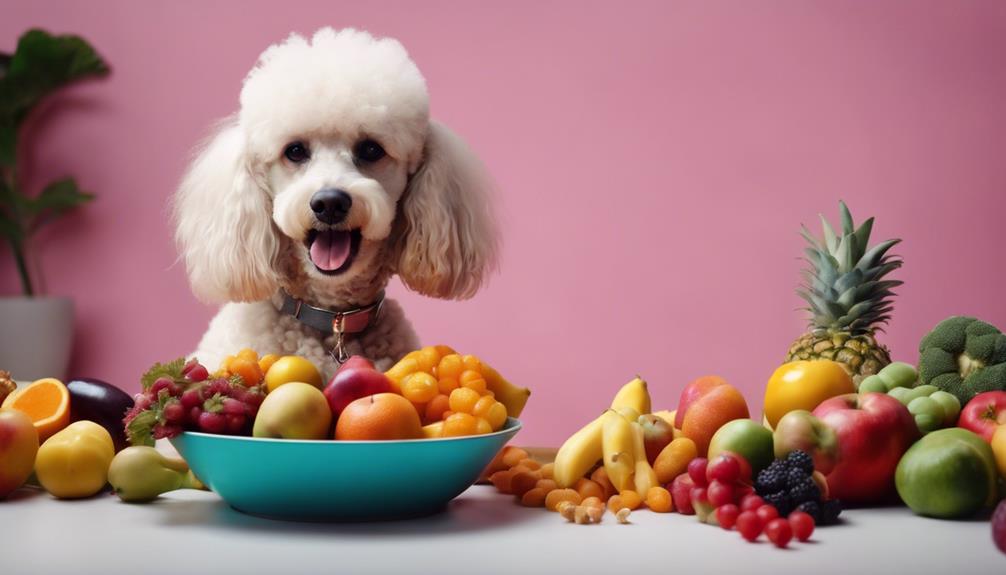
When considering the nutritional needs of your Poodle, focus on providing high-quality proteins, essential fats, digestible carbohydrates, and vital vitamins/minerals for a well-rounded diet. Protein plays a crucial role in muscle maintenance for Poodles, making real meat sources like chicken, beef, or fish essential in their diet. Essential fats, such as Omega-3 and Omega-6, are important for energy levels and maintaining a healthy coat in Poodles. Opt for complex carbohydrates such as sweet potatoes, brown rice, and oats to ensure they have the energy they need.
To meet your Poodle's nutritional requirements, choose high-quality dog food that lists real meat as the primary ingredient. Look for food that is moderate in fats and free from fillers like corn or wheat, as these can be difficult for Poodles to digest and may not offer the necessary nutrients. By selecting a balanced diet rich in protein, essential fats, carbohydrates, vitamins, and minerals, you can support your Poodle's overall health and well-being effectively.
Importance of High-Quality Protein
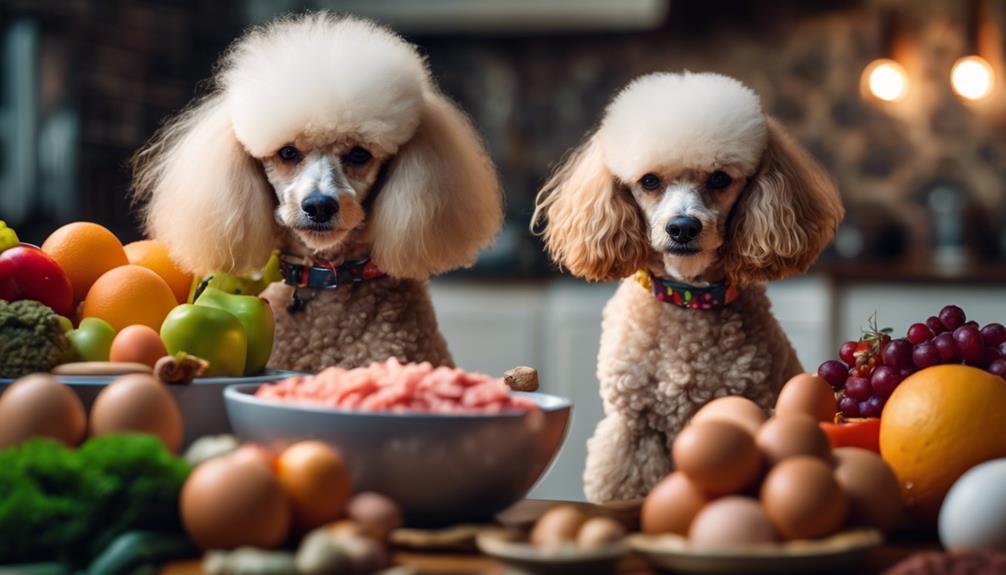
To ensure optimal muscle maintenance and growth in your Poodle, high-quality protein is vital as it provides the necessary building blocks for their muscles. Real meat sources such as chicken, beef, and fish are excellent choices due to their complete amino acid profiles essential for Poodle health. A protein-rich diet not only supports muscle and energy needs but also contributes to overall body condition and immune function in your beloved Poodle.
Protein for Muscle
High-quality protein sources, such as real meat like chicken, beef, and fish, are crucial for maintaining muscle mass and overall health in Poodles. Real meat serves as the primary protein ingredient necessary for optimal muscle development in your furry friend. Adequate protein intake is vital for enhancing muscle strength, supporting energy levels, and ensuring the overall well-being of Poodles. By incorporating quality protein sources into your Poodle's diet, you are actively contributing to their muscle health and vitality. Remember, the protein derived from real meat plays a significant role in not only building and maintaining muscles but also in promoting a healthy and active lifestyle for your beloved Poodle.
Protein for Energy
Transitioning from the focus on muscle health, the role of high-quality protein in a Poodle's diet extends to providing essential energy for their daily activities and overall well-being. High-quality proteins like real meat (chicken, beef, fish) are necessary for maintaining muscle mass and supporting an active lifestyle. These proteins are crucial for ensuring that Poodles receive the necessary amino acids for optimal health and muscle function. Quality protein sources aid in essential bodily functions and play a key role in promoting growth, development, and vitality in Poodles. By choosing protein-rich foods, you can help your Poodle meet its daily energy requirements and support its overall well-being. Make sure to prioritize high-quality proteins to keep your Poodle healthy and energetic.
Vital Essential Fats
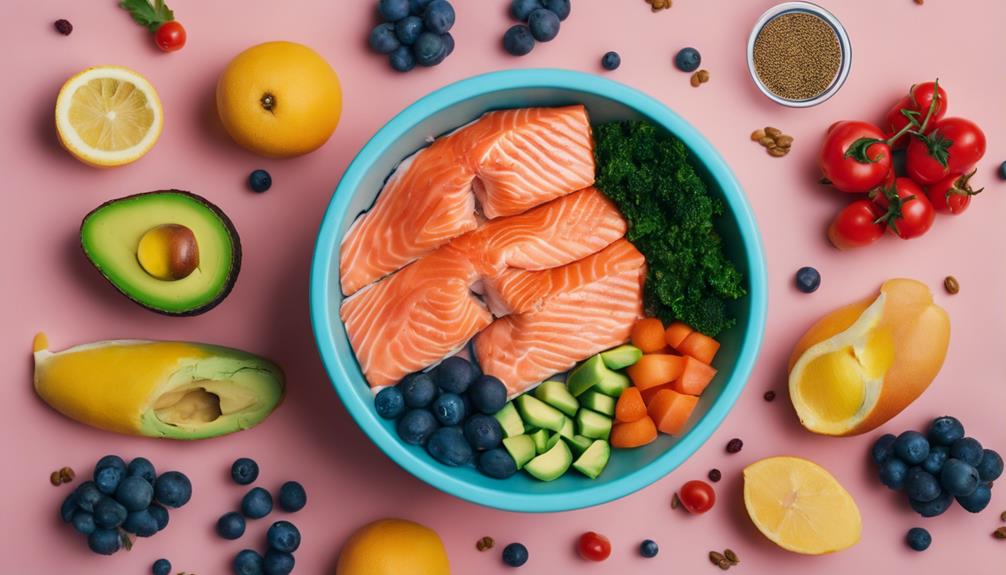
To ensure your Poodle's optimal health, understanding the importance of vital essential fats like Omega-3 and Omega-6 is crucial. These fats play a significant role in supporting your Poodle's energy levels, promoting a healthy coat, reducing inflammation, and supporting brain function. By incorporating sources of essential fats such as fish oil or flaxseed oil into your Poodle's diet, you can enhance overall well-being and support various essential bodily functions.
Omega-3 Benefits
Omega-3 fatty acids, vital for maintaining optimal health in Poodles, play a crucial role in promoting healthy skin and a shiny coat. These essential fats aid in reducing inflammation and supporting joint health, especially beneficial for Poodles prone to arthritis. Omega-3s also contribute to cognitive function, helping maintain alertness and mental acuity in aging Poodles. Including Omega-3 in a Poodle's diet can help reduce the risk of heart disease and support overall cardiovascular health. Sources of Omega-3 for Poodles include fish oil, flaxseed, and chia seeds, providing a well-rounded essential fat profile for optimal health.
- Promotes healthy skin and shiny coat
- Supports joint health and reduces inflammation
- Enhances cognitive function
- Reduces the risk of heart disease
- Supports overall cardiovascular health
Omega-6 Importance
Incorporating Omega-6 fatty acids into your Poodle's diet is essential for maintaining skin health, promoting a shiny coat, and supporting overall well-being. Omega-6, an essential fatty acid, is crucial for reducing inflammation and enhancing immune function in Poodles. Balancing Omega-3 and Omega-6 fatty acids is vital for your Poodle's optimal health. Sources of Omega-6 include oils like sunflower, safflower, and corn oil, which can be added to your Poodle's diet in appropriate proportions. Ensuring the right balance of Omega-6 fatty acids in your Poodle's diet is key to fostering healthy skin, a lustrous coat, and overall vitality. Remember, a well-rounded diet that includes Omega-6 is fundamental for the well-being of your beloved Poodle.
Carbohydrates for Energy
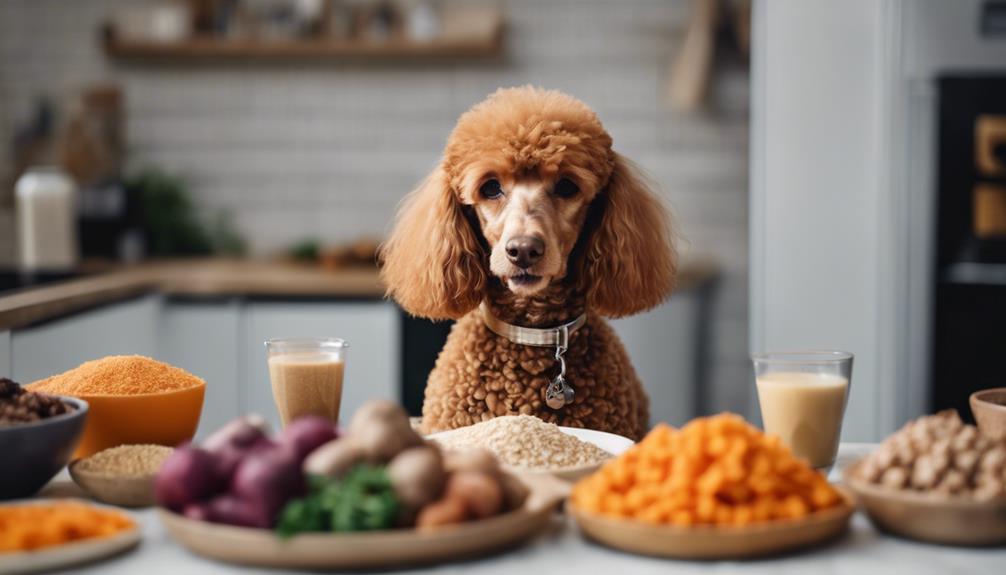
Carbohydrates such as sweet potatoes, brown rice, and oats play a vital role in providing sustained energy for active Poodles. These complex carbohydrates support digestive health and help maintain stable blood sugar levels in Poodles. Here are five key facts about the importance of carbohydrates for your Poodle's energy and well-being:
- Crucial Energy Source: Carbohydrates are a crucial source of energy for your Poodle's daily activities and exercise needs.
- Metabolism Support: Including carbohydrates in your Poodle's diet helps fuel their metabolism, aiding in the breakdown of nutrients for energy.
- Balanced Diet: Balanced amounts of carbohydrates contribute to a well-rounded diet for Poodles, promoting vitality and endurance.
- Blood Sugar Regulation: Complex carbohydrates assist in regulating blood sugar levels, preventing spikes and crashes that can affect your Poodle's energy levels.
- Overall Well-Being: Carbohydrates play a key role in supporting your Poodle's overall well-being, ensuring they have the energy and stamina for their active lifestyle.
Essential Vitamins and Minerals
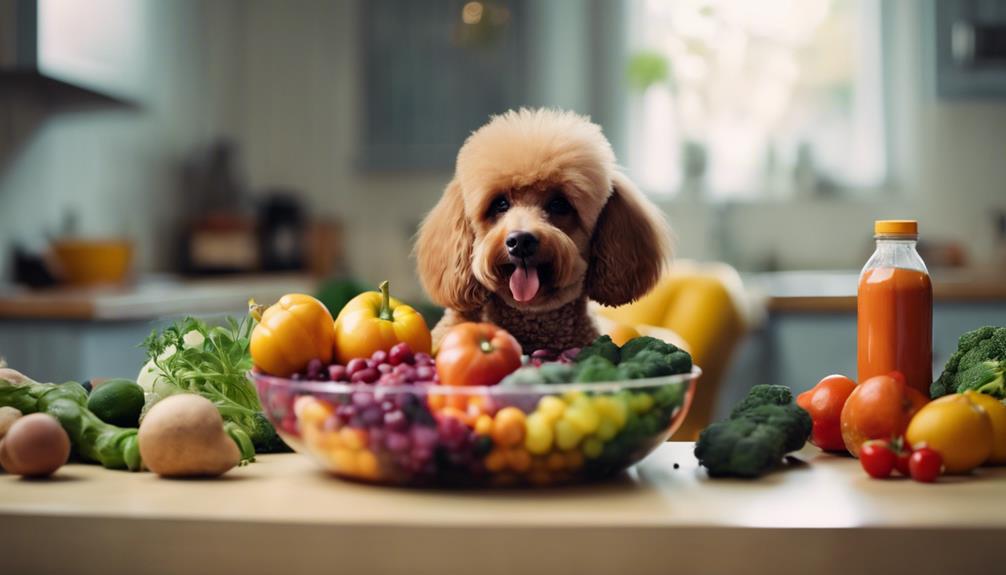
Ensuring your Poodle's diet includes a variety of essential vitamins and minerals is paramount for maintaining their overall health and vitality. Vitamin A is essential for your Poodle's vision, while Vitamin D aids in calcium absorption, crucial for bone strength. Vitamin E is important for skin health, keeping their coat shiny and healthy. Minerals like calcium, phosphorus, and zinc are vital for bone health and overall well-being in Poodles. The Vitamin B complex supports metabolism and energy production, crucial for their active lifestyle. Adequate levels of Vitamin C are necessary for immune function and collagen formation, promoting healthy skin and tissues. Additionally, minerals such as iron and potassium play key roles in oxygen transport and muscle function, ensuring your Poodle stays strong and energetic. By incorporating these essential vitamins and minerals into your Poodle's diet, you are providing them with the necessary building blocks for a healthy and happy life.
Weight Management Through Portion Control
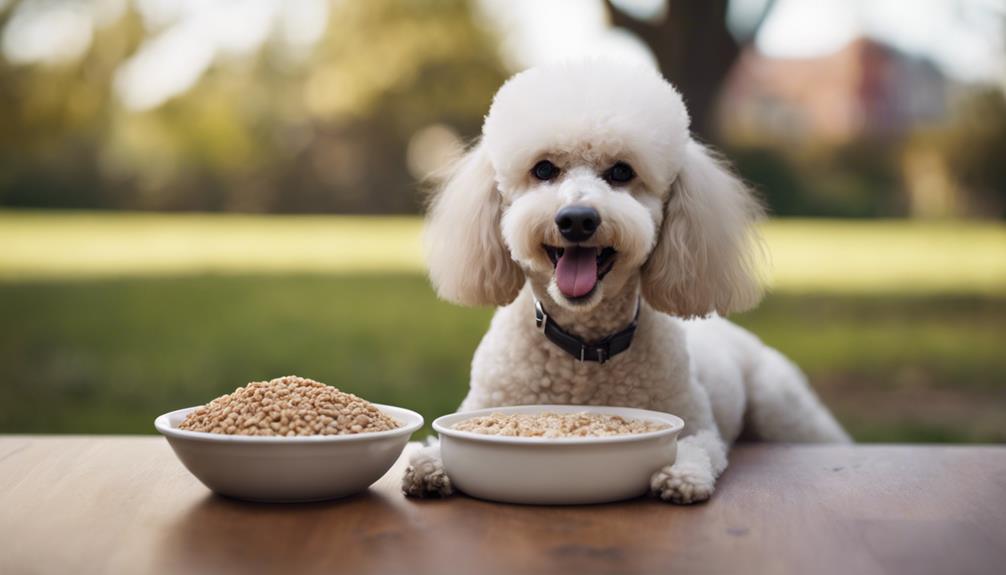
To effectively manage your Poodle's weight, implementing proper portion control is essential, particularly for toy breeds prone to obesity. Balanced meals tailored to your Poodle's activity level are crucial for weight management. Here are five key points to help you keep your Poodle at a healthy weight:
- Provide two to three balanced meals daily to support your Poodle's energy needs.
- Measure out 1 to 2.5 cups of dry food per day, divided into two meals, based on your Poodle's size and activity level.
- Follow the recommended feeding guidelines on the food packaging and adjust as needed to maintain a healthy weight.
- Splitting meals throughout the day can help prevent overeating and promote better weight management.
- Toy breeds like Poodles are prone to obesity, so monitoring their food intake and ensuring they get enough exercise is essential for their well-being.
Dietary Considerations for Poodle Puppies
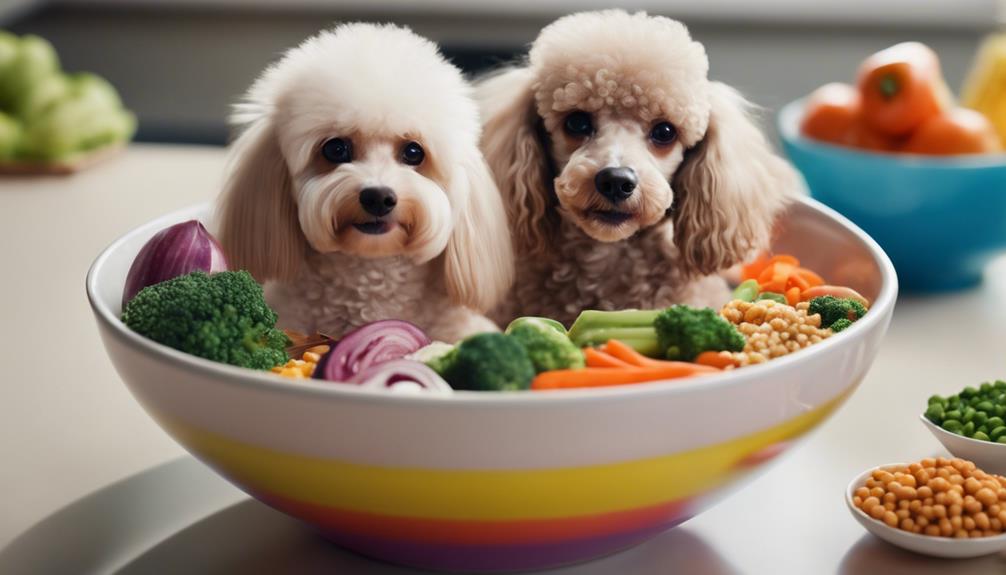
When considering the dietary needs of Poodle puppies, it is crucial to prioritize rich protein and fat for their growth and development. Puppies require a diet that supports their rapid growth and high energy levels. Providing small, frequent meals tailored to their needs is essential for healthy development. Puppy formulas are specially designed to meet the unique nutritional requirements of Poodle puppies, ensuring they receive the right balance of nutrients. Proper nutrition during this stage is vital as it lays the groundwork for their future health and well-being as adult Poodles. Consulting a veterinarian can offer guidance on choosing the best food for your Poodle puppy, guaranteeing they get the necessary nutrients for healthy growth.
| Nutritional Needs | Importance | Tips for Implementation |
|---|---|---|
| Rich Protein | Essential for growth | Choose high-quality puppy food with animal-based proteins. |
| Healthy Fats | Support development | Look for sources like fish oil or chicken fat in puppy formulas. |
| Small Frequent Meals | Maintain energy levels | Feed your Poodle puppy several small meals throughout the day. |
| Puppy Formulas | Tailored nutrition | Opt for formulas specifically designed for puppies to meet their needs. |
| Consulting a Veterinarian | Professional guidance | Regularly consult a vet for advice on your Poodle puppy's diet. |
Wet Vs. Dry Food Comparison
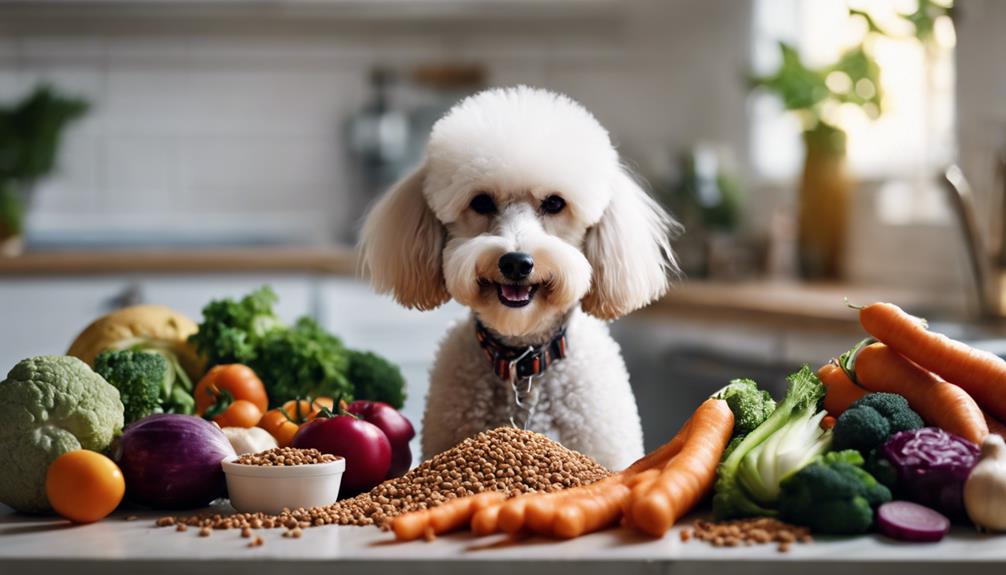
In the comparison between wet and dry food for Poodles, the hydration benefits of wet food and the dental health advantages of dry kibble play significant roles in determining the best option for your Poodle's diet.
- Wet food is hydrating and palatable for Poodles, providing essential moisture for overall health.
- Dry kibble aids in dental health by promoting chewing, reducing plaque buildup, and maintaining oral hygiene.
- Some Poodle owners choose a combination of wet and dry food to offer a well-rounded nutritional approach.
- While wet food may be gentler on the stomach, it's crucial to balance it with dry food to prevent digestive issues.
- Consider your Poodle's preferences and dental health condition when deciding between wet and dry food options.
Frequently Asked Questions
What Is the Best Food to Feed a Standard Poodle?
For standard Poodles, the best food includes high-quality protein sources, grain-free options, and raw diet benefits. Consider homemade meals, nutritional supplements, limited ingredient diets, organic choices, allergen-free options, senior dog formulas, and breed-specific formulas for optimal health.
What Can Standard Poodles Not Eat?
You should never feed Standard Poodles toxic foods like chocolate, grapes, and xylitol. These items can lead to serious health issues, including poisoning and organ damage. Stay vigilant and avoid sharing harmful foods with your pet for their safety.
How Many Cups of Food Should a Standard Poodle Eat?
You should feed your standard Poodle 1.5 to 2.5 cups of high-quality dry food daily. Splitting this into two meals can help manage hunger and energy levels. Adjust portion sizes based on age, activity level, and individual needs.
What Is Considered a Balanced Diet for a Dog?
To achieve a balanced diet for your dog, focus on high-quality protein sources like chicken or fish, complex carbohydrates such as sweet potatoes, essential fats like Omega-3, vitamins, minerals, fiber for digestion, adequate water intake, portion control, regular meals, and a consistent feeding schedule.
Conclusion
In conclusion, just as a sculptor carefully shapes a masterpiece, so too must you carefully craft the diet of your beloved Poodle. Each nutrient acts as a brushstroke, creating a beautiful canvas of health and vitality. By nourishing your Poodle with high-quality proteins, essential fats, carbohydrates, and vitamins, you are sculpting a work of art that will stand the test of time. Embrace the role of nutritionist and artist, creating a masterpiece of well-being for your furry companion.
